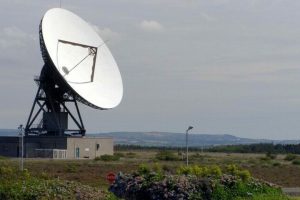OT Interviews: Five Questions with Goonhilly Earth Station CTO Matthew Cosby
21st Oct 2022
This week, Orbital Today continues its “Five Questions With…” interview series with Goonhilly Earth Station CTO Matthew Cosby. Matthew has been with GES since 2015, so he’s well-placed to see where the UK space industry is going and the path it might take to get there. In particular, he has a keen insight into a specific issue that will become more salient in the near future: telecoms between Earth and the Moon.
OT: Matthew Cosby, the world’s been captivated by the prospect of the Artemis-1 launch, and GES will be involved in the project, but how important is it for the UK space industry?
MC: Goonhilly Earth Station will be involved in several aspects of the Artemis-1 mission. NASA have requested that the European Space Agency support the tracking of the secondary payloads onboard Artemis-1, This will be done through the ESA’s ESTRACK network, of which Goonhilly is now a part.
With each new launch window, we have to wait for the timings from NASA for when we are called upon. In the first attempt we were required on the 2nd day after launch. On the second window we were scheduled only hours after the cubesats had separated from the rocket. We will wait and see when we will be needed for the next opportunity in November.
Along with tracking, we’ll be supplying telecommands to the six cubesats when they start diverging, meaning that each spacecraft will need a dedicated antenna during the critical lunar cruise phase. We’ll be relieving this uplink bottleneck.
And there’s not just tracking but ranging as well. And we’re part of a larger effort that includes universities and radio amateurs who with more modest equipment could be able to detect the carrier frequencies of the satellites in lunar orbit.
In the longer run, the Artemis-1 mission points to the fact that there’s a diverse section of the globe going to the Moon. There’s Capstone on its way now and Intuitive Machines, and iSpace coming up, for example. And as a result, the communications requirements will only increase. During the Apollo missions, they were happy to have any video at all, but now, people expect 4K video, for example.
And with that there is a renewed interest in the Moon. If right now, we’re hoping to have 2-3 missions to the Moon, in 10 years, there could be hundreds. The UK space industry will have a part of that.
OT: Hundreds? How will that affect communications?
MC: Well, there will be a dash for higher frequencies and data rates. After all, we are limited by physics. The bandwidth to the Moon hasn’t increased, so we have to go up in frequency. There are related factors involved, too. Intuitive Machines is offering rideshare on its upcoming lunar flight. Lowering costs on flights increases access, and then with more spacecraft, there will be more antennas or spacecraft around the Moon offering relay services.
What you’re going to see when you have humans on the Moon will be in 4k and 8k video. People won’t tolerate less, meaning that this drives the telecommunications infrastructure.
Matthew Cosby on developing telecoms systems with the Moon
OT: So what needs to be developed to run video from the Moon? What gets borrowed from, say, terrestrial mobile networks?
MC: The space links are things we’ve worked on and used for 40 odd years. However, there’s a difference between a network with a space link and terrestrial network. This comes down to error free transmission on terrestrial networks, and that it’s not the same with space links. Space and terrestrial links use different protocols and error correction. So, the transition between terrestrial and space networks is what we’ll be seeing in the near future. However, you are still limited by physics, and the larger distances involved moving from a terrestrial system to a lunar one.
OT: Are government and industry relations where they need to be at for the space industry to move forward in the UK?
MC: The UK is a signatory to the Artemis Accords, and communications is something the UK can be involved with. There’s an opportunity for the UK there. But there’s also local government. For example, the local government in Cornwall is taking measures to increase high tech employment in the area.
OT: Would you call education a weak link for the UK when it comes to space?
MC: No, education isn’t a weak link per se. The space industry wants a lot of specialists, but each company has its own set of particularities to deal with. The schools and universities produce excellent students, we just need more. What we have to do is try and educate the parents, teachers, and students in the UK that it can be done here and convince them to join a space company not any other industry. We need to get the word out that you can do an exciting space career in industry or academia in the UK, if you want to.
If your daughter or granddaughter says she wants to work in the space community here, it’s completely possible.
Orbital Today would like to thank Matthew Cosby for taking the time to share his vision with us.




Thank you for your comment! It will be visible on the site after moderation.